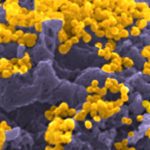Lien vers Pubmed [PMID] – 33872329
Lien DOI – 10.1371/journal.ppat.1009526
PLoS Pathog 2021 04; 17(4): e1009526
HIV-1 infects CD4 T lymphocytes (CD4TL) through binding the chemokine receptors CCR5 or CXCR4. CXCR4-using viruses are considered more pathogenic, linked to accelerated depletion of CD4TL and progression to AIDS. However, counterexamples to this paradigm are common, suggesting heterogeneity in the virulence of CXCR4-using viruses. Here, we investigated the role of the CXCR4 chemokine CXCL12 as a driving force behind virus virulence. In vitro, CXCL12 prevents HIV-1 from binding CXCR4 and entering CD4TL, but its role in HIV-1 transmission and propagation remains speculative. Through analysis of thirty envelope glycoproteins (Envs) from patients at different stages of infection, mostly treatment-naïve, we first interrogated whether sensitivity of viruses to inhibition by CXCL12 varies over time in infection. Results show that Envs resistant (RES) to CXCL12 are frequent in patients experiencing low CD4TL levels, most often late in infection, only rarely at the time of primary infection. Sensitivity assays to soluble CD4 or broadly neutralizing antibodies further showed that RES Envs adopt a more closed conformation with distinct antigenicity, compared to CXCL12-sensitive (SENS) Envs. At the level of the host cell, our results suggest that resistance is not due to improved fusion or binding to CD4, but owes to viruses using particular CXCR4 molecules weakly accessible to CXCL12. We finally asked whether the low CD4TL levels in patients are related to increased pathogenicity of RES viruses. Resistance actually provides viruses with an enhanced capacity to enter naive CD4TL when surrounded by CXCL12, which mirrors their situation in lymphoid organs, and to deplete bystander activated effector memory cells. Therefore, RES viruses seem more likely to deregulate CD4TL homeostasis. This work improves our understanding of the pathophysiology and the transmission of HIV-1 and suggests that RES viruses’ receptors could represent new therapeutic targets to help prevent CD4TL depletion in HIV+ patients on cART.

